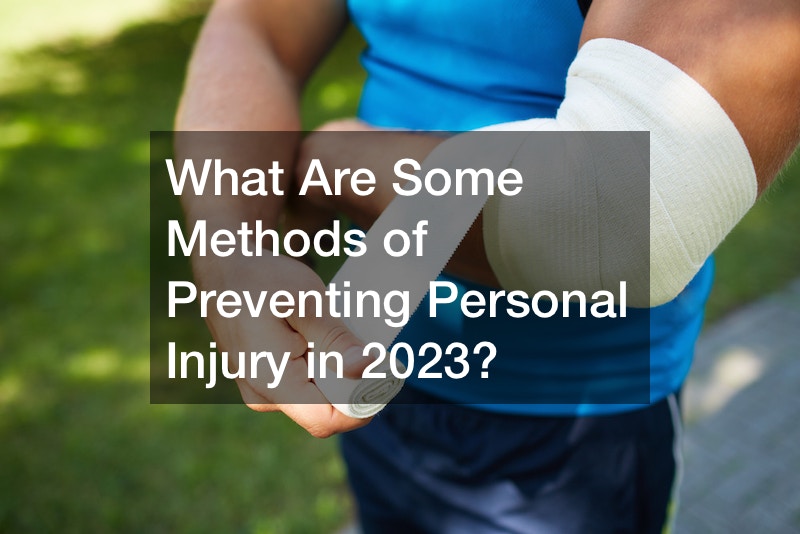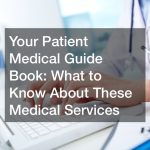As 2023 draws to a close, it serves as a reminder of the ongoing need to place our well-being front and center. Preventing personal injuries isn’t just a timely concern; it’s a timeless one. While navigating the complexities of daily life, especially in these final months, let’s solidify our commitment to safety. You’ll find a curated list of tried-and-true strategies to minimize personal injuries and crucial information that’s especially relevant as we prepare for another year ahead.
How can we prevent personal injury? We work on actionable, reliable solutions. We’ll delve into a range of effective methods to significantly reduce the risk of personal injuries, helping you conclude this year on a safer note and carry these protective measures into the future.
Remember that pursuing safety is not a one-off endeavor but a continuous journey. Although the world around us always changes with new technologies and innovations, our immediate priority remains simple: equipping you with practical steps for personal injury prevention throughout your life. Being proactive can distinguish a close call from a life-altering experience.
Comprehensive Strategies for Injury Prevention
Consume Enough Calcium

Maintaining healthy bones is a proactive measure to avoid getting hurt. Calcium is not only a mineral we know is in milk; it’s the foundational element of the skeletal system, enhancing its durability and well-being. Consuming calcium-rich foods such as milk and leafy greens. These act as a sturdy safeguard against potential injuries. Ask your doctor about supplements if your diet doesn’t provide enough calcium. Supplements offer a convenient and effective way to fill the gap.
When bones are brittle and lacking in important nutrients, serious injuries can occur. Sometimes, you might need special medical treatment for these bone injuries. Bone graft manufacturers supply medical-grade grafts that can significantly speed up, enhance bone healing, and get you back on your feet. Alongside medical interventions, lifestyle choices can dramatically affect overall health. Engaging in weight-bearing activities like weightlifting can amplify your bone density.
Due to the complexity of bone health, move past a one-size-fits-all approach. Before you dive into any bone-strengthening routine, meet with your doctor to get a plan tailored just for you. Whether it’s integrating calcium supplements, increasing physical activities, or considering advanced treatments like bone grafts, medical advice should be your first step in effectively reinforcing your bones.
Have a Healthy Sex Life

Although sexual health correlates with our overall well-being, it is frequently overlooked. A fulfilling sex life offers numerous physical and psychological benefits. The advantages do more than contribute to a balanced and less stressful life; they can also effectively reduce the likelihood of personal injuries. Therefore, taking steps to enhance sexual health should be part of our broader personal safety and well-being strategy.
Problems like erectile dysfunction and low libido extend beyond sex life disruptions; your emotional health can become compromised. The stress and anxiety resulting from sexual health issues can impair your mental focus and understanding, and being in a compromised state can make you more prone to accidents in your daily life.
Beyond emotional well-being, a healthy sex life also directly impacts physical health. Regular sexual activity can improve heart health and your immune system. These benefits manifest as increased stamina and physical resilience, assets for injury prevention.
Given the number of benefits, address any issues in your sexual health as soon as possible. A consultation with a healthcare provider can offer invaluable insights into underlying problems and how to solve them. Treatment options can include pharmaceutical aids, hormone therapy, and psychosexual counseling. Healthcare professionals will set you up with a tailored treatment path.
By proactively addressing sexual health concerns, you do more than reclaim an integral part of your life. You also strengthen your emotional resilience and physical fortitude, making you less susceptible to personal injuries.
In the end, a healthy sex life has its perks, but it’s just one part of the bigger picture regarding avoiding injuries. Oral health and hygiene are often neglected and can affect more than our mouths.
Minimize Oral Problems

See your dentist regularly and take proper care of your teeth. This often-overlooked aspect of health can significantly impact your safety if an infection or medical problem arises. Poor oral health does more than affect your smile; it can indirectly lead to various health issues that increase the risk of personal injuries.
Misaligned teeth can cause issues like headaches and poor posture. Inconsistent posture can lead to muscle imbalances and create issues with your gait, elevating your risk of slips and falls. One of the newest ways doctors can help with teeth misalignment is by using cutting-edge solutions like Invisalign.
It’s worth noting that teeth alignment is just one part of the larger equation; oral health is equally crucial in minimizing your risk of injury.
Other mouth problems include tooth decay, gum disease, and untreated cavities. Such issues can cause ongoing pain and infections, creating a risk for personal injuries. Living with mouth pain as a distraction could affect your ability to concentrate on everyday tasks.
When tooth decay, gum disease, or untreated cavities are left to progress, the consequences can extend beyond your mouth. For instance, gum disease has been linked to heart issues and diabetes, making you more vulnerable to broader health complications. Tooth decay can lead to severe infections and spread to other parts of the body.
Living with such conditions also makes it harder to focus, increasing your likelihood of accidents and personal injuries. Treating these oral issues isn’t just about maintaining a healthy smile; it’s also a step in protecting your overall well-being and minimizing the risk of more extensive health issues that could lead to injuries.
Use routine dental check-ups as more than oral hygiene exams. Check-ups act as an early warning system, detecting and addressing oncoming problems before they escalate into more severe issues. Modern dentistry offers many solutions for preemptive care and overall health improvement, from fillings to root canals to periodontal treatments.
Dental check-ups and other preventive measures should be part of your regular health routines. By doing so, you’re preserving your smile and safeguarding yourself against avoidable personal injuries.
Look Into Daycare to Help With Responsibilities
Juggling modern life, parenting, and personal safety can be challenging. The mix of stress and fatigue heightens the risk of home accidents, especially when young kids are around. That’s where daycare services step in. More than just a time-saver, daycares offer a secure, supervised space for your children, making your home safer.
When you visit local nurseries, don’t just consider it a baby-sitting solution; pay attention to the facility’s layout and how staff interact with the kids. The ideal nursery or daycare should fit your safety standards and match your child’s temperament, energy level, and developmental needs. Parents and caregivers can better focus on keeping a safe home, knowing that children are well looked after, significantly reducing chances for personal injury.
Regular Visits to an Ophthalmologist and Hearing Test Center Are Essential
Your senses serve as your main alert system for spotting potential hazards, which is crucial in averting personal injury. As we age or develop certain medical conditions, these senses may weaken. Regular appointments with an ophthalmologist and a hearing test center are key to maintaining vision and hearing health.
Catching issues with your vision or hearing before they become irreversible can drastically lower your risk of accidents. Utilizing aids like prescription glasses or hearing aids can elevate your quality of life. These aids also serve as essential tools for preventing injuries. Taking care of your sensory health is more than maintaining good vision and acute hearing; the aim is to craft a safer environment for yourself.
Stay Sober
Drugs and alcohol are known to impair judgment and coordination, and being under the influence increases your risk of personal injury. A specialized addiction treatment clinic will offer a range of therapies designed to promote sobriety and continual recovery. Treatment and recovery are crucial not just for your mental and physical health but also for ensuring the safety of yourself and others.
If you’re struggling with sobriety and recovery, seek professional help immediately. While the support of family and friends is valuable, achieving long-term recovery often necessitates more specialized care. A substance abuse treatment center will provide the expertise and tools needed to maintain a sober life and prioritize safety.
Stay Logical and Smart
Being mentally alert is essential for reducing the risk of personal injury. A focused mind allows you to make swift and thoughtful choices that can steer you clear of hazardous circumstances. Investing in activities and practices that boost mental understanding can serve as a proactive step in safeguarding your well-being.
While we first encounter the development of logical reasoning skills in early learning centers, the development process continues well into adulthood. Adults are urged to engage in activities that sharpen logical reasoning abilities continually. Sudoku, crossword puzzles, and strategic video games are more than just hobbies or pastimes; they are cognitive tools that refine problem-solving skills and bolster risk-assessment capabilities.
Mental exercises are akin to a gym workout for your brain, strengthening neural connections and improving reaction times. In real-world scenarios, this could translate to identifying a wet floor ahead of you, recognizing a dangerous traffic situation while driving, or even gauging the safety of a ladder before climbing it. These decisions may seem small individually, but they minimize your risk of injury.
It’s crucial to integrate mental exercises into your daily or weekly routine to maintain this high level of cognitive function. In a world filled with distractions and fast-paced changes, a sharpened mind provides the discernment needed to succeed and stay safe. You create a holistic shield against personal injuries as you cultivate physical and mental well-being.
Stay Mobile
Being active is key to a healthy life and lowers your risk of getting hurt. Mobility transcends physical fitness; it is a defense against accidents, slips, and falls that can occur anytime. A consistent physical activity routine allows your muscles to remain engaged and supple. Be active and avoid stiffness and joint pain that can lead to more serious injuries.
When evaluating your mobility, note any discomfort you may be experiencing from head to toe. Foot pain, in particular, is often neglected but warrants attention before the situation possibly deteriorates. Consulting a foot and ankle specialist should not be overlooked if you encounter any foot pain.
Whether it’s pain while walking, swelling, or other discomfort, seeking professional help can offer targeted treatments to address your condition. Treatment plans may vary from non-invasive physical therapy exercises to minor surgical interventions. The goal is always the same: restoring your range of movement and agility to prevent accidents and injuries.
Lastly, evaluate the important role of mental alertness in staying mobile. An alert mind can quickly react to potential hazards, be it an uneven surface on the road or an unexpected obstacle while hiking. Quick mental reflexes and a physically agile body create a comprehensive shield against personal injuries.
By taking a multifaceted approach to staying mobile — encompassing physical activity, professional healthcare advice, proper nutrition, and mental alertness — you better protect yourself against the types of injuries that can happen when you least expect them.
Keep Blood Pressure Up
Low blood pressure might not seem like a big deal, but it can have serious consequences. A fainting spell may occur due to an unanticipated drop in blood pressure and lead to severe injuries. In emergencies, intravenous infusion therapies can act as a quick fix to rapidly stabilize your blood pressure levels.
Lifestyle adjustments are likely more sustainable and effective solutions for long-term management and ongoing safety. Simple changes like including nutrient-rich foods and adequate hydration in your daily diet can play an essential role in maintaining a healthy blood pressure range. Just as well, medications prescribed by healthcare professionals can offer a long-term safety net.
Similar to visiting your dentist, regular medical check-ups and blood pressure monitoring are part of your health routine. A healthcare provider can offer personalized advice and treatment plans, adapting over time to keep you healthy. Keeping tabs on your blood pressure isn’t just a health goal. It’s a safety imperative. Being proactive in this area can reduce your risk of personal injury, protecting your physical and overall health.
Personal Injury Prevention in 2023
Armed with these thoughtful strategies, you’re well-prepared to keep yourself safe from personal injuries while tackling the ups and downs of the rest of 2023. Prevention is better than a cure, and a proactive approach to safety can save you from physical harm and the emotional and financial toll that injuries can bring. Let’s prioritize our health and safety and make 2023 a safer year.


